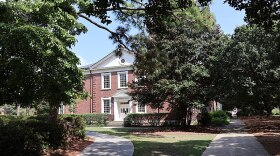Colleges and universities across North Carolina – and across the country – are developing plans and backup plans for how to conduct classes this fall during the coronavirus pandemic. All are weighing safety and health risks with financial realities, and the realities of college life.
What do universities’ current plans to reopen look like right now?
Many universities’ publicly released plans are still vague and under development. However, some general trends are emerging:
- Condensing the school year.
- Staggering class schedules to reduce class sizes.
- Offering hybrid options to accommodate schedule changes and allowing some students to remain off campus.
The administration at UNC Chapel Hill has released more details about its plan compared to its peers, and that has opened the university up to scrutiny. 670 faculty and other instructors have signed a petition making demands on that plan.
What does this faculty group at UNC Chapel Hill call for in its petition?
The petition lists three major demands:
- No instructor will be required to teach in person and no instructor will be required to disclose personal health concerns
- All members of the UNC-CH community will be required to wear masks and practice physical distancing in classrooms and public settings
- During the first weeks of classes UNC-CH will test all staff, students and faculty on campus for coronavirus and develop a rigorous plan that requires regular and ongoing testing
Maria DeGuzman, a professor at UNC Chapel Hill who helped organize the petition, said the university’s administration has shifted its message about some, but not all, of these aspects of its planning following the petition.
The university has not promised widespread testing for the coronavirus in the fall, nor assured instructors they will each have the final call on whether they teach remotely or in person.
Administrators have shifted from saying mask wearing will be encouraged to suggesting it may be a requirement enforced under the university’s honor code.
"It is true that the university's rhetoric has softened a little bit," DeGuzman said. "But the problem is, where are the actions? And where are the concrete plans?"
DeGuzman does not know yet how petition signers will respond if their demands are not met.
How can universities enforce rules and policies on social distancing?
Kevin McClure is a professor who studies higher education at UNC Wilmington, and he’s raised concerns about reopening colleges nationwide. He argues administrators need to be realistic about the extent to which students will follow health guidance.
“I see many things about well, we're going to ask students to do X, Y, and Z,” McClure said. “And those of us that spend time with students kind of find it laughable because the likelihood that you're going to be able to pull off that level of compliance would be remarkable.”
DeGuzman described driving around Chapel Hill this past weekend and seeing young people at restaurants and bars on Franklin Street and congregating on apartment balconies without masks on. She wonders how that will change when the semester begins.
What are administrators saying about how to balance education, safety and the school's finances?
Administrators in the UNC System have said that there is a strong sense based on polling that students want to come back, and that if they’re not offered an on-campus experience, students may not enroll for the fall or will drop out. Decreasing enrollment would pinch budgets that are already facing increased costs and a potential loss in state funding.
Some faculty have questioned whether the cost of reopening has been considered to the extent that the cost of not reopening has been. DeGuzman called for a more thorough cost analysis.
“What if lawsuits start flying around?” DeGuzman asked. “What happens if [UNC Chapel Hill’s] hospital system is overwhelmed?"
Administrators are hoping for the best, but planning for the worst. What are the biggest fears?
The ultimate fear is an outbreak that results in the deaths of faculty, staff or students. McClure at UNC Wilmington said he believes “lives are on the line.”
“There are going to be people working at and teaching at colleges and universities in the United States who I think are going to fall ill and some may die, because we decided that we absolutely needed to bring everybody back on campus in the fall,” McClure said.
UNC Chapel Hill’s plan acknowledges the possibility of infection. The university is setting aside two residence halls to house students who become infected or who are exposed to the coronavirus.
One UNC Chapel Hill staff person who spoke on background wondered, “Who’s going to clean the bathrooms in those dorms?”











